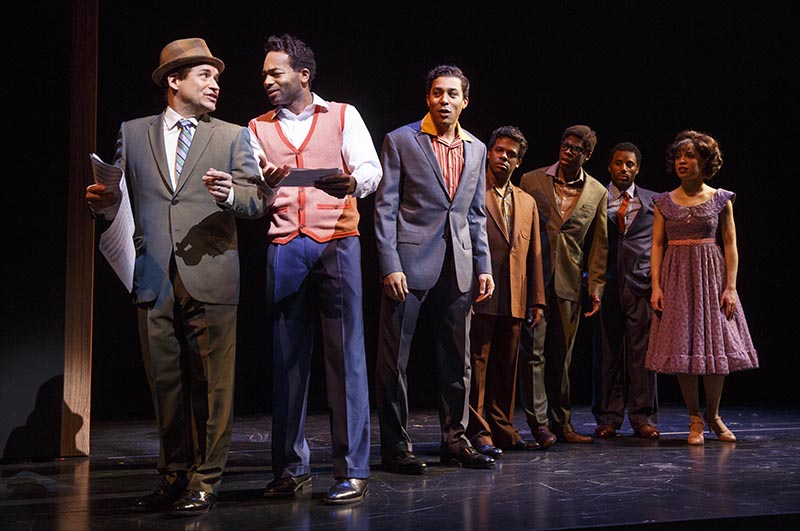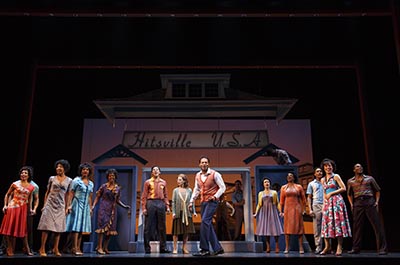
Joan Marcus
Michael Arnold, Brandon Victor Dixon (Berry Gordy), Charl Brown (Smokey Robinson) & Cast.
Leigh Walker (LW): Here's our June issue, one for each of you, where we featured Motown: The Musical in our Summer [Guide] calendar.
Kirstie A. Martinelli (KAM): So Marin is just nine miles north from here.
Charles Randolph-Wright (CRW): We know Marin
Kevin McCollum (KM): He knows Marin, I've worked a lot of shows here — oh good they got the Temps shot.
KAM: And here's a little thank you from San Francisco for you guys.
KM: Well, you win because you brought food –– whatever you want we will give you.
KAM: Truly amazing. I read about your foundation in South Carolina.
CR: My family business just turned 100 a couple months ago and it’s been incredible. Working with Mr. Gordy showed me what I can do in my hometown. And I talk about it often: it’s the opening the door to possibility, giving people permission. I’m from a rural town from South Carolina. We actually went and auditioned in Charlotte and they’ve never had a Broadway audition in Charlotte, NC. I literally saw every single person. I’d see them in groups first and then I’d go out and talk to them. I grew up in the woods right down the street. You can’t let geography limit your dream. And to be able to be in that position. To say that, to do that; that’s what the show’s about. We have that respect and camaraderie.
KAM: I was so excited to read about your deal with Fox [McCollum has been tapped to develop stage productions based on the Fox catalogue].
KM: [about Fox] It’s an exciting opportunity. It was one of those things where I think it was an evolution, because there’s a lot of stories. And I think Broadway, and I think this is where Motown is going to thrive…what nobody really understands is Broadway is an international business. Given the net, set and the jet, which we didn’t have when Broadway began, countries like South Korea, Brazil, China even, Russia, they all can now they want the Western musical. People travel to New York, the touring world has grown, which was my first business, which I started off, which is why I know San Francisco so well, was a distribution agency for shows. So, people want the Broadway musical. We can be here for multi weeks. Back to Fox, one of the things that a movie can provide, and Motown has this too, and they did it more organically for decades, let’s say there’s a film, like a black swan, which, you know, South Korea loves. What’s great about Motown, Motown was the first international phenomenon, even more than the Beatles. What Motown did around the world, but that’s what I think is so interesting, and why I think Mr. Gordy went into television and film, he understood “I have to get it to the people” and at that time, you actually had to walk it to the DJ, convince him that it wasn’t race music it was music done by black people. It was for the world. Having done Motown I also started to realize that as well –– dream big. It keeps going. We could have definitely called the show “Dream Big” but it is the ethic.
CRW: Mr. Gordy wanted it on stage. He could have done this in any medium. It could have been a film, it could have been a mini-series. There’s that thing that happens in a theatre that’s live that doesn’t happen anywhere else. It doesn’t happen in a movie theater. It’s this relationship between the performers and the audience. And that’s what the Motortown Revue did, and went all around the world. Motown is doing that again. And to watch audiences respond to this is –– it’s extraordinary.
KAM: People are up dancing?
CRW: The song is Dancing in the Street. They’re actually dancing in their seats. The first note that they hear –– they scream.
KM: You are taken to a place viscerally, through the music. That’s the power of Motown. Motown takes away all the niche.
CRW: There are times where I’ve gone to a show and I’ll think, “Oh this is predominantly a black audience. And when the lights come up it’s white people” They’re screaming! When did they learn how to do this? [Laughter]
LW: We've always known how to do that. [Laughter] The first song I ever learned from my dad was My Girl by the Temps.
CRW: And see –– that’s exactly what we’re talking about.
KM: He was singing it to you and you felt special.
CR: I love that you’re saying this [to LW]. There’s a moment in the show. Berry Gordy is falling in love with Diana Ross. It’s happening on My Girl – My Girl is when he’s falling for her but at the same time The Temptations are preforming –– and what I learned how to do on this show is how to have two stories happen at once. My daughter, I sang this to her when she was three years old – there’s so much there. If it was all story, you wouldn’t have that experience. But if it was no story, you also woudn’t have that experience. We found that balance of how to take that Motown story and the audience’s story and combine them. And they weave.
KAM: Why do you think you were chosen as director for this musical?
CRW: Mr. Gordy says when I walked into his house I said to him “nobody can do this the way I can do this.” I still don’t believe I actually did it.
KM: And you said that when we were talking early on “watching Michael Jackson…”
CRW: I went to the march on Washington with Mr. Gordy which was the anniversary and everyone came up to him. And I had this memory of being a kid and listening to Martin Luther King’s speeches in my cousin’s basement. They used to play them on this record. We had just started working on the show and there’s this scene where Diana comes to Mr. Gordy, and he’s mixing Martin Luther King’s speeches. I hadn’t realized it –– it was just part of my DNA. That music, those words. All those things I’ve ever done –– combined. I understand Mr. Gordy’s journey. I understand the story he wanted to tell and a lot of times people ask me because I’m a writer, "how is that?" This was his journey. My job as director is to put his journey on stage –– his story, his writing and I’m so thrilled at what we did. How we did it because he is thrilled.
LW: Just quickly: What are your favorite Motown songs. I’m dying to know.
CRW: "What’s Going On." "I Want You Back" had to be the first because I was so obsessed with The Jacksons.
KM: I love "Ain’t No Mountain High Enough." "All I Need To Get By." I love "My Girl", I love "Tears of a Clown".
CRW: "Indiana Wants Me", okay – look that up. [Laughter]
KM: For Once in My Life – which you may not know is Motown…
Kirstie: What did you not want this musical to be?
CRW: Oh good question. I didn’t want it to – well it couldn’t have been because Berry Gordy –
KM: It’s the kind of musical, that when you come to see it, it breaks every expectation even though you think “oh I know Motown music”. I was never worried that we weren’t gonna make it. You know, people were saying it’s a jukebox musical. Yes, it’s a catalogue, but Berry Gordy wrote three original songs for this show that we kind of keep as a secret weapon. So you’re going to hear three new songs that are written purely for this show.
CRW: It’s fun sometimes watching the audience try to sing with it. You don’t know this you can’t sing this song. ("Can I Close the Door", "Hey Joe")
KM: This is not just a jukebox. This is an American Dream musical based on the most transformative catalogue ever created. And the big secret weapon is people said “oh it’s a huge story and it’s a big story about America”. It’s a love story – him and Diana – but it’s also a love for what’s possible when everyone was telling him “you can’t do that” and how he built that family.
CRW: And how love conquers all. The show opens with him not wanting to go to Motown 25 – which stunned me when he told me this – that he was angry then, because most of the artists had left Motown by then. He was angry that had happened. The journey of Motown is for him to decide "can I go there. Can I let go, can I close the door on the people I love?" When he wrote this song “I was thinking about not just Motown, but the families (the two sisters that were fighting, the couple who can’t get this…)." You hear this song and you think “there’s so much history, there’s so much there, I can’t close the door on that person.” We all wanted a show that spoke to all of that.
KM: We knew that if we stayed true to Motown, it’s about family and it’s about love. We were never going to fall into a trap of what it might have been. Which is just “and then I wrote and then I discovered this person”. And it’s not that. It’s not linear in that way.


